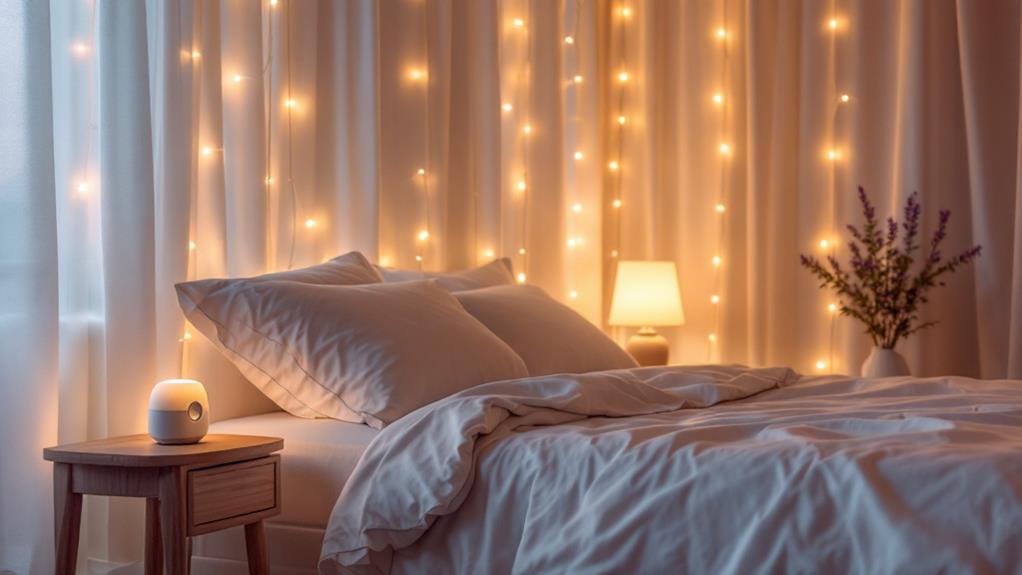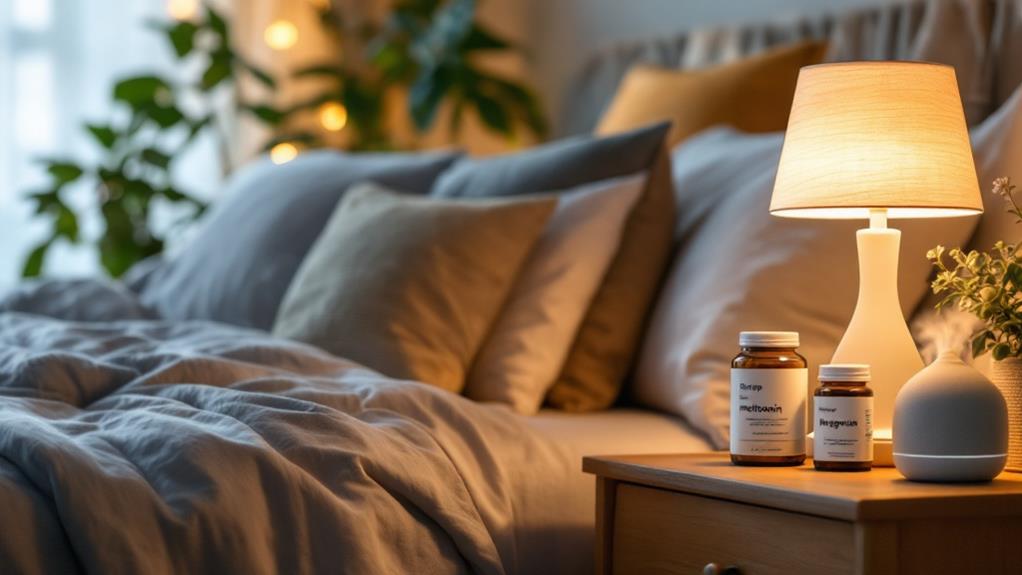Top 10 Ideas to Improve Your Sleep Wake Cycle

To improve your sleep-wake cycle, establish a consistent sleep schedule to reinforce your natural rhythm. Eat mindfully, avoiding late meals and caffeine. Create an ideal sleep environment with cool temperatures and minimal light. Limit daytime naps to 20-30 minutes and choose early afternoon. Engage in regular physical activity, ideally outdoors. Manage light exposure; increase it in the morning and reduce blue light before bed. Monitor caffeine and alcohol intake, and consider sleep supplements like melatonin or magnesium. Recognize signs of sleep disorders and seek help if needed. If you investigate further, you'll uncover extra insights.
Consistent Sleep Schedule
A consistent sleep schedule is key to improving your sleep quality and general wellness. By going to bed and waking up at the same time each day, you reinforce your body's natural circadian rhythm. This internal clock regulates sleep patterns, helping you achieve the recommended 7-8 hours of sleep duration for adults. Sticking to a regular sleep schedule, even on weekends, minimizes disruptions to your internal clock, ensuring better sleep quality.
When your sleep patterns are irregular, your body struggles to maintain its circadian rhythm, leading to poorer sleep quality and increased daytime fatigue. To combat this, make it a priority to adhere to a regular sleep schedule. If you find yourself unable to sleep within 20 minutes of bedtime, engage in relaxing activities such as reading or listening to soft music. This approach helps prevent anxiety related to sleep, allowing you to return to bed only when you feel genuinely tired.
Maintaining a consistent sleep schedule not only improves your sleep quality but also elevates your general health by reducing daytime fatigue. Accept the benefits of a stable sleep routine and watch as your energy levels and focus increase.
Mindful Eating Habits
Mindful eating plays a crucial role in enhancing your sleep quality and general health. To guarantee a restful night, aim to have your dinner at least two to three hours before bedtime, as consuming large meals close to sleep can disrupt your rest and cause discomfort. Incorporating foods rich in tryptophan, like turkey and pumpkin seeds, into your diet can increase melatonin production, the hormone that helps regulate sleep.
Pay attention to your caffeine intake, especially in the afternoon and evening. Caffeine consumed within eight hours of bedtime can cut into your sleep time by up to 45 minutes, negatively impacting sleep quality. Instead, opt for herbal teas or decaffeinated beverages later in the day. Likewise, while alcohol might make you feel drowsy initially, it can disrupt sleep and interfere with hormone levels. To avoid these issues, steer clear of alcohol within three hours of going to bed.
A balanced diet emphasizing whole foods while avoiding sugar and refined carbs in the evening can support healthier sleep patterns and overall well-being. By adopting these mindful eating habits, you'll pave the way for better sleep and a more balanced lifestyle.
Optimize Sleep Environment

To truly improve your sleep quality, it's not just about what you eat but also the environment where you sleep. Optimizing your bedroom environment is vital for restful nights. Start by confirming a comfortable temperature, ideally between 60°F to 65°F (16°C to 18°C). This cool setting promotes deep sleep and comfort throughout the night.
Dark environments are fundamental for quality sleep. Use blackout curtains or sleep masks to block out light, supporting melatonin production, which helps regulate your sleep-wake cycle. Furthermore, reduce noise levels with white noise machines or earplugs to mask disruptive sounds, allowing for deeper, uninterrupted sleep.
Invest in quality bedding. A supportive mattress and comfortable pillows greatly affect sleep comfort and spinal alignment, helping reduce aches and pains. Keeping your bedroom clean and organized fosters a calming atmosphere that encourages relaxation and better sleep quality.
To improve your bedroom environment, consider these simple steps:
- Maintain a cool, dark, and quiet room: Use blackout curtains and noise reducers.
- Invest in high-quality bedding: Confirm your mattress and pillows provide proper support.
- Create a calming atmosphere: Keep your space clean and clutter-free for relaxation.
Manage Daytime Napping
While daytime napping can be a revitalizing way to recharge, it is essential to manage it wisely to avoid disrupting your nighttime sleep. To maintain a healthy sleep-wake cycle, keep naps short, ideally between 20 to 30 minutes. Long naps exceeding an hour can interfere with your nighttime sleep quality and confuse your internal clock. By focusing on short naps, you'll increase alertness without compromising your general sleep health.
Timing is just as significant as duration. Aim to nap in the early afternoon, as later naps can make it difficult to fall asleep at night. This strategic timing helps your body's internal clock remain in sync, ensuring your nighttime sleep isn't disturbed. If you're a night shift worker, you might need to adjust your napping schedule to fit your unique routine, but still prioritize consistency and timing to support your health.
Monitoring your napping habits is key. Inconsistent napping patterns can negatively affect your general sleep quality, so it's essential to balance daytime napping with nighttime rest. By managing your naps effectively, you support a healthier sleep-wake cycle, ultimately enhancing your general well-being.
Regular Physical Activity

In relation to improving your sleep-wake cycle, regular physical activity plays an essential role. By engaging in at least 150 minutes of exercise each week, you can greatly enhance sleep quality. It promotes deeper, more restorative sleep cycles and helps reinforce healthy sleep patterns. Exercising outdoors is particularly advantageous as exposure to natural light helps regulate your circadian rhythms. This can lead to a better alignment with your natural sleep-wake cycle, reducing symptoms of insomnia and increasing sleep duration and efficiency.
Timing matters too. Morning or early afternoon workouts are preferred because they improve sleep quality without interfering with your nighttime rest. Physical activity reduces stress and anxiety, common barriers to restful sleep, thereby further enhancing your comprehensive sleep quality.
To make the most of your physical activity for better sleep:
- Choose activities you enjoy: This makes it easier to stick with your routine.
- Be consistent: Make exercise a regular part of your schedule to maintain its sleep benefits.
- Listen to your body: Adjust intensity and timing based on how your body responds to guarantee optimal sleep.
Incorporate these practices into your routine, and you'll find yourself on the path to healthier, more restful sleep.
Stress and Anxiety Reduction
Stress and anxiety can cast a long shadow over your sleep-wake cycle, making relaxation techniques vital tools for better rest. High levels of stress can greatly disrupt your sleep quality, so it's essential to incorporate mindfulness and deep breathing into your routine. These relaxation techniques help calm your mind and body, paving the way for improved sleep.
Journaling your thoughts and worries before bedtime can also play a major role in anxiety reduction. By putting pen to paper, you clear your mind, allowing for a more peaceful shift to sleep. Engaging in calming activities like reading or taking a warm bath further reduces stress, preparing your body for rest.
Regular physical activity is another effective strategy for managing stress and anxiety. Exercise releases endorphins, which naturally decrease stress levels and improve sleep quality. Plus, practicing sleep hygiene by incorporating techniques like meditation and progressive muscle relaxation can lead to better overall sleep outcomes.
Light Exposure Management

To improve your sleep-wake cycle, managing light exposure is vital. During the day, make sure to increase your exposure to bright light, especially morning light. This practice supports your circadian rhythm and boosts sleep quality as a natural sleep aid. Studies show that bright light in the morning can help you fall asleep faster at night. Create a consistent light exposure routine to reinforce your internal clock, which means getting consistent natural light during the day and minimizing artificial light at night.
In the evening, it's important to reduce blue light exposure. Devices emit blue light that decreases melatonin production, making it difficult to relax and drift into a restful sleep. Consider using blue light-blocking glasses or turning off screens at least two hours before bedtime. Also, manage artificial light at night by dimming lights and using night mode settings on your devices.
For those with irregular sleep patterns or seasonal changes affecting their sleep, light therapy can be advantageous. Using artificial bright light devices helps provide the necessary light exposure to regulate your sleep routine. Incorporate these strategies to improve your sleep quality effectively.
- Increase morning bright light
- Reduce evening blue light exposure
- Consider light therapy for irregular patterns
Monitor Caffeine and Alcohol
While aiming for better sleep, monitoring your caffeine and alcohol intake is vital. Caffeine consumption late in the day can greatly reduce sleep duration by about 45 minutes and compromise the quality of your REM sleep. It's important to monitor caffeine intake throughout the day and avoid caffeinated drinks at least eight hours before bedtime. This allows your body enough time to process the stimulant, helping you achieve a more restful sleep.
Alcohol might make you feel drowsy initially, but it can disrupt sleep later by altering melatonin production. This disruption can lead to increased symptoms of sleep apnea and snoring. As a result, it's wise to avoid alcohol close to bedtime to maintain a consistent sleep-wake cycle. A 2023 review emphasized that late caffeine intake drastically reduces general sleep quality, highlighting the significance of being aware of hidden caffeine sources in foods and drinks.
Consider Supplements for Sleep

If you're looking to improve your sleep quality, considering supplements might be a valuable step. Melatonin supplements can effectively signal your brain for relaxation and sleep. Research suggests taking doses from 0.1 to 10 mg before bedtime for ideal results. Another option is magnesium, which plays an essential role in regulating neurotransmitters that promote sleep. It's been shown to improve sleep quality and reduce insomnia symptoms, making it a significant addition to your bedtime routine.
Valerian root is another natural sleep aid that might help you fall asleep faster and boost sleep quality. Studies suggest doses of 300-600 mg before bedtime can be effective. Chamomile tea, rich in antioxidants, may promote sleepiness and improve overall sleep quality. Regular consumption could lead to better sleep outcomes.
Before starting any sleep supplements, consulting with a healthcare professional is advisable. Individual responses can vary markedly, and ensuring safety and effectiveness is vital.
Consider these options to address sleep issues:
- Melatonin supplements: Signal relaxation and boost sleep
- Magnesium: Improve sleep quality and reduce insomnia symptoms
- Valerian root and Chamomile tea: Natural aids for relaxation and better sleep quality
Recognize Sleep Disorders
Sleep disorders can greatly impact your quality of life, affecting both nighttime rest and daytime activities. Recognizing conditions like insomnia, sleep apnea, and restless legs syndrome is vital for maintaining quality sleep. Insomnia often leads to difficulty falling or staying asleep, which can hinder your daily functioning and heighten the risk of anxiety and depression. On the other hand, sleep apnea causes repeated interruptions in breathing during sleep, leaving you feeling fatigued during the day.
Restless legs syndrome, affecting about 10% of the population, creates uncomfortable sensations that worsen at night, making it hard to fall asleep. These sleep disorders don't just disturb your sleep habits; they also compromise your general health. As a result, it is important to diagnose such issues early.
Consulting healthcare professionals for persistent sleep problems can lead to effective interventions. They can help you identify the root cause of your sleep issues and guide you toward better sleep quality. Whether it's lifestyle changes or medical treatment, addressing these problems promptly can improve your sleep and better your life. Don't overlook persistent sleep issues—taking action is key to achieving restful nights and energetic days.




